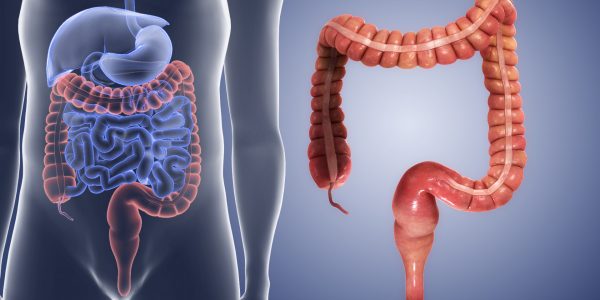
Intestine: The second brain
All our emotions, feelings of well-being are generated in our intestines, which many call: second brain!
90% of serotonin, the well-being hormone, is produced in the intestine.
WHAT DOES IT MEAN THAT THE INTESTINE IS THE SECOND BRAIN… ???
We have a real brain inside our guts, and its neuronal function is very similar to the brain activity of the head. The digestive system has an extensive network of neurons, which is found between the two muscular layers of its walls.
The structure of digestive neurons is totally identical to the structure of brain neurons and they have the ability to release the same neurotransmitters, hormones, and chemical molecules. I mean the enteric nervous system (ENS) or our second brain. It is not a metaphor; is an official term accepted by the medical society.
HOW TO STIMULATE THE INTESTINAL BRAIN IN OUR FAVOR… ???
The intestinal brain releases its chemicals such as serotonin (the famous hormone of happiness and well-being) in response to healthy eating and digestion.
It should be noted that serotonin is not produced only in the brain but, on the contrary, most of it (90%) is released in the intestine.
If we eat well, varied and with a proportional report of all the nutrients; If we have healthy eating habits (without rushing, chewing well and not being distracted) the digestive system responds and thanks us with a feeling of well-being, giving us a good supply of energy, vitality and optimism.
On the other hand, digestive neurons are also stimulated with abdominal breathing techniques, stretching, gentle massage of the gut, and with gentle and relaxing heat, applied to the belly area.
TO WHAT EXTENT IS ADEQUATE ABDOMINAL HYGIENE IMPORTANT, SO THAT IT CAN DO ITS FUNCTIONS WELL … ???
The most important thing is the balance between the entry of food and all the substances that we swallow and the discharge of all the residues and secondary products of the cellular and bacterial function that we have to expel.
If we are overfed or if we consume too much questionable food regarding its nutritional quality, in this way we easily saturate and upset our internal pipes.
If for any pathological or functional reason digestion and / or intestinal transit is slow and not completely, then we accumulate waste within ourselves and we can reach a toxic overload or autointoxication; the latter manifests itself in multiple ways, has different faces and symptoms.
Of course, cleaning is important, practicing an internal purification is a “guarantee” to avoid raising the risks of the development of many diseases and an opportunity for your body to increase performance, energy and have a greater nutritional contribution.
HOW TO MAINTAIN INTESTINAL HYGIENE IN A NATURAL WAY, IN OUR HABITS OF EVERYDAY LIFE … ???
With proper digestive hygiene: respect the signals that the body sends us, not suppress the natural needs to go to the bathroom or be in a hurry to do so.
Create a ritual and try to repeat it every day, around the same hours, calmly and long enough to be able to empty your belly well and feel light and clean inside.
Insist, repeat and keep training your body to respond to your ritual and create a strong conditioned reflex.
In addition, I recommend drinking 2 liters of fluids a day, ingesting at least 400 g of varied vegetables every day, not forgetting legumes (2-3 times a week, at least 200 g in each intake), consuming products fermented (kefir, sauerkraut), three servings of fruit a day, mixed nuts, at least 30 g a day. And if you can’t meet these recommended daily amounts, you may want to take natural fiber supplements.
It is convenient from time to time (one day a month or a week) to accelerate your own intestinal transit by taking a lot of prune juice, kiwis or kefir or / and magnesium supplements, and with that you can ensure a deeper cleaning. & lt; / p & gt;
HOW TO EAT … ???
Savoring and appreciating the process; leisurely, chew, analyze the tastes and textures of food, do not eat “in the meantime” (while doing this or that), do not distract our attention with other simultaneous activities, such as watching TV or reading the press. & lt; / p & gt;
HOW TO THINK … ??? WHAT SHOULD A PERSONAL ATTITUDE BE THAT BENEFITS THE FUNCTIONING OF THE INTESTINES AND THE ORGANISM IN GENERAL … ???
We all know that stress, anxiety, emotional tension, control of the digestive system, many people somatize psychological problems and have strong and varied digestive discomfort.
The thoughts can cause a binge or a cut in digestion and / or appetite. A central nervous system that is not under emotional pressure or chronic stress, and that receives adequate breaks and breaks, proposes a good function to the digestive system.
In my book Pure Health he describes various rituals and techniques that help to synchronize and balance our two brains and benefit from their functions and potentials.
HOW TO GET AROUND … ??? HOW SHOULD AN APPROPRIATE PHYSICAL ACTIVITY BE … ???
Regularly. The most that our body likes is predictability and regularity. With a rhythmic and repetitive physical activity, the body will thank you and it will provide you with a magnificent well-being.
Sporadic and abrupt physical activities are not as valuable or healthy as regularized exercise and firmly incorporated into your routine.
The movements and stretches, even if they are very simple and short in time (at the beginning, until you get into the routine and like them and dedicate more time to them), if they are done every day and at assigned times, you They will activate all vital systems and ensure short and long-term well-being.
HOW WILL I KNOW IF OUR DIGESTIVE SYSTEM IS IN GOOD SHAPE… ??? & lt; / p & gt;
You have to know how to listen to it: symptoms such as heartburn, burning, reflux, heaviness, bloating, pain, too much gas, intestinal transit irregularity, nausea, etc., are their ways of expressing themselves, it is digestive language, the warning that something is wrong.
Then you have to try to take a case and observe your digestive system carefully and patiently: why and when do you experience those discomfort (with what type of food or in what situation) and correct it.
What happens frequently is that people get used to living with bloating or diarrhea (or the opposite) or they think that it is something normal or embarrassing, or that their digestion is that delicate, without looking for the answers or trying to correct the quality of your digestive function.
WHAT CAN THE SOUNDS MEAN IN THE DIGESTIVE DEVICE… ???
Many things: normally they are gases and liquids that move through the digestive tract thanks to visceral muscle movements. We can have or accumulate too much gas or / and residual remains, or / and have our digestive muscle function altered.
It is not pathological, rather functional, but if it becomes annoying and painful, in which case I recommend observing you and writing everything down and then going to see a specialist.
HOW & amp; nbsp; CAN AN EXCESSIVELY ACID ENVIRONMENT AFFECT THE DIGESTIVE SYSTEM … ??? & amp; nbsp; & lt; / em & gt;
The healthy body usually balances and controls the pH (which is the parameter of acidity) of its tissues and its environment.
Excessive acidification, in the stomach for example, can be caused by bacteria / infections, by inflammatory processes or by abuse of “acidifying” foods such as carbohydrates and sweets, for example, or soft drinks.
Acidification of the contents of the large intestine can be caused by an imbalance of the intestinal microflora, an overgrowth of aggressive bacteria and / or fungi and by a poor diet.
Again, the key is in the diet and in the observation itself.
HOW TO REBALANCE IT …?
Rule out a possible infection or an inflammatory process, which requires treatment with specialists. Purification rituals, green smoothies, adequate consumption of vegetables and fruits, water, alkalizing mineral supplements and probiotics.
Provided by:
Alicia A. Lozano Amador




